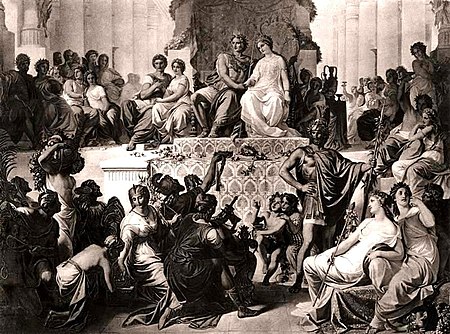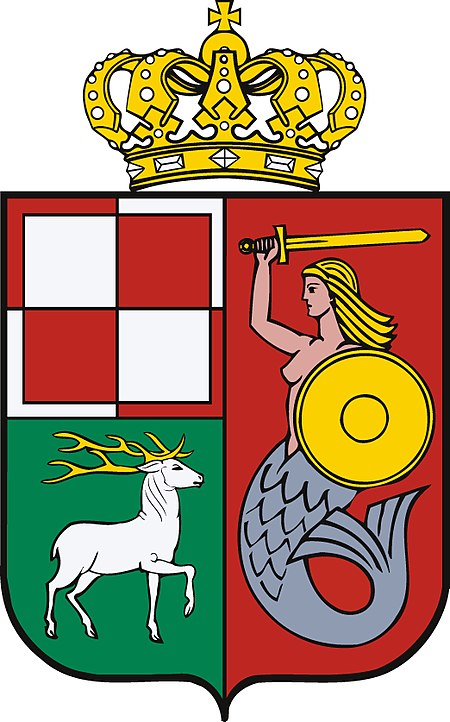New Zealand at the 2016 Summer Paralympics
| |||||||||||||||||||||||||||||||||||||||||||||||||||||||||||||||||||||||||||||||||||||||||||||||||||||||||||||||||||||||||||||||||||||||||||||||||||||||||||||||||||||||||||||||||||||||||||||||||||||||||||||||||||||||||||||||||||||||||||||||||||||||||||||||||||||||||||||||||||||||||||||||||||||||||||||||||||||||||||||||||||||||||||||||||||||||||||||||||||||||||||||||||||||||||||||||||||||||||||||||||||||||||||||||||||||||||||||||||||||||||||||||||||||||||||||||||||||||||||||||||||||||||||||||||||||||||||||||||||||||||||||||||||||||
Read other articles:

Alexander Agung menikahi Stateira dan Hephaistion menikahi saudari Stateira, Drypetis, di Susa. Upacara pernikahan Susa adalah sebuah pernikahan massal yang diadakan oleh Aleksander dari Makedonia pada 324 SM di kota Susa, Persia.[1] Aleksander berniat untuk secara simbolis menyatukan budaya Persia dan Yunani, dengan mengambil seorang istri Persia sendiri dan mengadakan pernikahan massal dengan adat Persia bersama dengan para perwiranya, dimana ia melakukan perjodohan terhadap istri-i...

Coco de mer Status konservasi Terancam (IUCN 3.1)[1] Klasifikasi ilmiah Domain: Eukaryota Kerajaan: Plantae Divisi: Magnoliophyta Kelas: Liliopsida Ordo: Arecales Famili: Arecaceae Subfamili: Coryphoideae Tribus: Borasseae Genus: LodoiceaComm. ex DC. Spesies: Lodoicea maldivica(J.F.Gmelin) Persoon Sinonim[2][3] Daftar Borassus sonneratii Giseke Cocos maldivica J.F.Gmel. Cocos maritima Comm. ex H.Wendl. Lodoicea callypige Comm. ex J.St.Hil. Lodoicea sechellarum La...

Bridge in Steigen, NorwayEngeløy BridgesEngeløybrueneView of the bridgeCoordinates67°54′16″N 15°10′52″E / 67.9045°N 15.1811°E / 67.9045; 15.1811Carries Fv835CrossesBogøysundetLocaleSteigen, NorwayCharacteristicsDesignCantilever bridgeMaterialConcreteTotal length548 metres (1,798 ft)Longest span110 metres (360 ft)Location The Engeløy Bridges (Norwegian: Engeløybruene) are two bridges in the municipality of Steigen in Nordland county, Norway. T...

Islam menurut negara Afrika Aljazair Angola Benin Botswana Burkina Faso Burundi Kamerun Tanjung Verde Republik Afrika Tengah Chad Komoro Republik Demokratik Kongo Republik Kongo Djibouti Mesir Guinea Khatulistiwa Eritrea Eswatini Etiopia Gabon Gambia Ghana Guinea Guinea-Bissau Pantai Gading Kenya Lesotho Liberia Libya Madagaskar Malawi Mali Mauritania Mauritius Maroko Mozambik Namibia Niger Nigeria Rwanda Sao Tome dan Principe Senegal Seychelles Sierra Leone Somalia Somaliland Afrika Selatan ...

Art collection of the British Royal Family Art exhibition at the King's Gallery, Buckingham Palace[a] The Royal Collection is the private art collection of the British royal family, owned by the British monarch — currently King Charles III — and overseen by the Royal Collection Trust. Some of the collection are owned in right of the Crown and others are owned by the King as a private individual. It is made up of over one million objects,[1] including 7,000 paintings, over ...

Iterative simulation method A particle swarm searching for the global minimum of a function Part of a series on theEvolutionary algorithm Artificial development Artificial life Cellular evolutionary algorithm Cultural algorithm Differential evolution Effective fitness Evolutionary computation Evolution strategy Gaussian adaptation Grammar induction Evolutionary multimodal optimization Particle swarm optimization Memetic algorithm Natural evolution strategy Neuroevolution Promoter based genet...

Sceaux 行政国 フランス地域圏 (Région) イル=ド=フランス地域圏県 (département) オー=ド=セーヌ県郡 (arrondissement) アントニー郡小郡 (canton) 小郡庁所在地INSEEコード 92071郵便番号 92330市長(任期) フィリップ・ローラン(2008年-2014年)自治体間連合 (fr) メトロポール・デュ・グラン・パリ人口動態人口 19,679人(2007年)人口密度 5466人/km2住民の呼称 Scéens地理座標 北緯48度4...

Norwegian neo-Nazi paramilitary leader and musician Haakon ForwaldForwald in 2019BornHaakon Forwald1978 (age 45–46)Røyken, Buskerud, NorwayNationalityNorwegianOccupationNordic Strength Council MemberKnown forLeading member of Ultranationalist group Nordic Strength. Former Leader of the Nordic Resistance Movement in Norway Haakon Forwald (born 1978 in Røyken)[1] is a leading member of the extreme right-wing Nordic paramilitary group Nordic Strength (Norwegian: Nordisk...

Archeological term; material produced during the process of lithic reduction Example of lithic refitting Series of refitted debris In archaeology, debitage is all the material produced during the process of lithic reduction – the production of stone tools and weapons by knapping stone. This assemblage may include the different kinds of lithic flakes and lithic blades, but most often refers to the shatter and production debris, and production rejects. Debitage analysis Debitage analysis, a s...

Pride in exaggerated masculinity For other uses, see Machismo (disambiguation). Macho redirects here. For other uses, see Macho (disambiguation). Not to be confused with Masochism. This article has multiple issues. Please help improve it or discuss these issues on the talk page. (Learn how and when to remove these template messages) This article possibly contains original research. Please improve it by verifying the claims made and adding inline citations. Statements consisting only of origin...

The flag of Warsaw. Following article contains a list of current and historical flags used to represent the districts of the city of Warsaw, Poland, as well as its other historical subdivisions. Current flags Białołęka The flag of Białołęka, with the proportions of 5:8.The flag of Białołęka, with the proportions of 15:28, de facto used by the district. The flag of the Białołęka is divided horizontally into three stripes of the same width. They are, from top to bottom, light green...

Defunct Spanish automobile manufacturer The Elizalde was a Spanish automobile manufacturer from 1914 until 1928. Arturo Elizalde Rouvier opened a garage in Barcelona in 1909, and used it to manufacture automobile parts. He and his brother-in-law, Rafael Biada Navarro, were co-managers of the company they had formed with J. M. Vallet y Arnau, under the name Sociedad Mercantil J. M. Vallet y Cia. Vallet provided the company with a workshop at 149 Paseo de San Juan in Barcelona. Elizalde soon re...

2022年新澤西州聯邦眾議員選舉 ← 2020 2022年11月8日 新澤西州聯邦眾議員全部12個議席 多數黨 少數黨 政党 民主党 共和黨 上届结果 10 2 赢得席次 9 3 席次差额 ▼ 1 ▲ 1 民選得票 1416422 1160260 得票率 54.27% 44.46% 得票变动 ▼ 3.01% ▲ 2.88% 選舉結果 縣結果 民主黨 50–60% 60–70% 70–80% 共和黨 50–60% 60–70% 202...

Lo stemma Visdomini La torre dei Visdomini a Firenze I Visdomini (o Bisdomini) erano un'antica famiglia patrizia di Firenze. Traeva il nome dall'attributo di vicedomino, ovvero vice Signore, che in questo caso indicava il vescovo di Firenze: era loro compito infatti curare gli interessi della diocesi nei periodi di sede vacante. Indice 1 Storia familiare 2 Edifici 3 Bibliografia 4 Altri progetti Storia familiare Il privilegio dei Visdomini affondava le radici nell'alto medioevo, e coinvolgeva...

«Izquierda» redirige aquí. Para otras acepciones, véase Izquierda (desambiguación). Gráfico que muestra el espectro político de izquierda a derecha que según Hans Eysenck se puede graficar en la brújula política. En política, la izquierda es el sector del espectro político que defiende la igualdad social y el igualitarismo, frecuentemente en contraposición a las jerarquías entre individuos.[1][2][3][4][5] El término «izquierda» se utilizó p...

Chart showing the estimated number of HIV infections among key population groups aged 15-49 years from 1980 to 2014 The first HIV/AIDS cases in Nepal were reported in 1988. The HIV epidemic is largely attributed to sexual transmissions and account for more than 85% of the total new HIV infections. Coinciding with the outbreak of civil unrest, there was a drastic increase in the new cases in 1996. The infection rate of HIV/AIDS in Nepal among the adult population is estimated to be below the ...

NASA Extreme Environment Mission Operation project NEEMO ProgramA NEEMO 11 crewmember works outside the undersea habitat AquariusMission statementTo see what extreme environmental challenges astronauts may face in space, and to form solutions by using the ocean, as an equivalent environment on earthLocationFlorida, United StatesOwnerNASA, Florida International University, Aquarius Reef BaseEstablished2001 (2001)Websitewww.nasa.gov/mission/neemo/ NASA Extreme Environment Mission Operation...

2006 New Brunswick general election ← 2003 September 18, 2006 2010 → ← outgoing membersmembers →55 seats of the Legislative Assembly of New Brunswick28 seats needed for a majorityTurnout67.52% [1] First party Second party Third party NDP Leader Shawn Graham Bernard Lord Allison Brewer Party Liberal Progressive Conservative New Democratic Leader since 2002 1997 2005 Leader's seat Kent Moncton East Ran for Fredericton-...

Prime Minister of Egypt (1984–1985) Not to be confused with the actor Kamal Haasan. Kamal Hassan Aliكمال حسن عليAli in 197843rd Prime Minister of EgyptIn office17 July 1984 – 4 September 1985PresidentHosni MubarakPreceded byAhmad Fuad MohieddinSucceeded byAly Lotfy MahmoudMinister of DefenseIn office5 October 1978 – 14 May 1980Preceded byAbdel Ghani el-GamasySucceeded byAhmed Badawi Personal detailsBorn(1921-09-18)18 September 1921Cairo, Sultanate of EgyptDie...

Metro station in Kolkata, India For the metro stations with similar names, see Dum Dum metro station. Dum Dum Cantonmentদমদম ক্যান্টনমেন্টKolkata Metro stationGeneral informationLocationSubhas Nagar, Dum Dum, Kolkata, West Bengal 700065IndiaCoordinates22°38′17″N 88°24′44″E / 22.6380°N 88.4123°E / 22.6380; 88.4123Owned byMetro Railway, KolkataOperated byMetro Railway, KolkataLine(s)Yellow LinePlatformsSide platformsTracks2Co...


